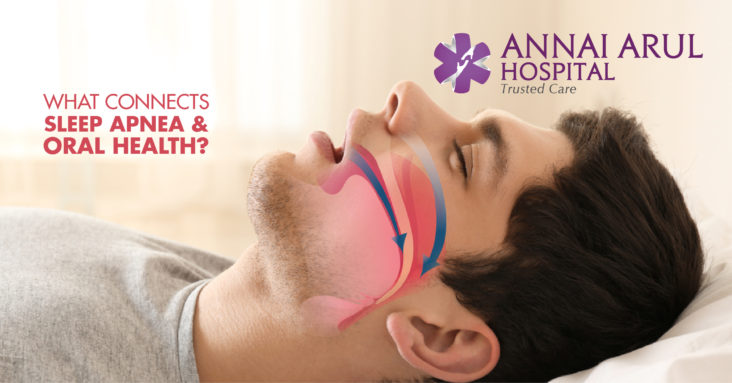A range of sleep problems, such as snoring and insomnia are signs of a sleep disorder called sleep apnea. Sleep apnea has a major impact on ones oral health and dental problems can also be caused. There is definitely a relevant connection between sleep apnea and your oral health.
What causes sleep apnea?
Sleep apnea is caused due to tissue collapse in the airway which is due to weak airway muscles. A larger tongue, overweight, and other factors can also cause sleep apnea. Sleep apnea disturbs the sleep cycle and saps the daytime energy while causing decrease in mental performance and long term health.
What are the symptoms of sleep apnea?
The common symptoms of sleep apnea include reduced or absent breathing, frequent and loud snoring, gasping for air during sleep, daytime sleepiness, decreased attention, forgetfulness, dry mouth, headache, frequent urination during night, decreased libido.
In addition to above symptoms sleep apnea in women causes depression, anxiety, insomnia, frequent wakefulness etc.
What are the risk factors for sleep apnea?
The major risk factors for sleep apnea are being overweight, a family history of snoring, being male, being over 40 years, being post-menopausal in women, a large neck, large tonsils or a large tongue, a small jaw bone and nasal sinusitis.
What is the connection between sleep apnea and oral health?
A good quality sleep always keeps you healthy and reduces the chances of bad breath, mouth ulcers, and other gum diseases. Major dental problem associated with sleep apnea is TMJ disorder, bruxism and mouth breathing.
What is TMJ disorder?
Temporomandibular joint disorder and sleep apnea go hand-in-hand. The TMJ connects the lower jaw to the upper jaw and there are two TMJ joints one on each side of the face. The symptoms of TMJ include jaw pain, head, neck and ear pain, problem chewing, jaw joints that make clicking sounds and sometimes locked jaw which disables opening and closing of mouth. People with sleep apnea are at three times more risk to develop TMJ.
Bruxism
Bruxism is also known as teeth grinding or clenching of the jaw. White it can happen anytime, it mostly happens during a person’s sleep. Bruxism affects good sleep, causes headaches and neck and jaw pain. Bruxism is caused due to uncontrolled and involuntary movement of the jaw during the sleep and hence considered sleep related condition. It also causes teeth loss, cracked and chipped teeth surfaces and sometimes broken teeth.
Mouth Breathing
Another effect of sleep apnea is a propensity to breathe through the mouth or mouth breathing. It results in proclamation of teeth (malocclusion) dry mouth, tooth decay, plaque, mouth sores, gingivitis and periodontal disease.
What is the treatment?
When a dentist detects a dental problem related to sleep apnea, the medical advice would be to alleviate dental symptoms through certain behaviour modifications including improvement of sleep quality. The condition can also be managing through dental health improvement, orthodontic treatments and repair of the problems along with treatment for dry mouth. A dental mouthpiece (splint) is suggested to cut down risks of damage through grinding and clenching of the teeth.


